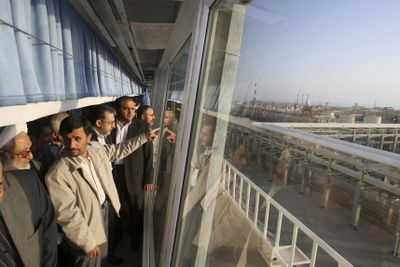Russia, Iran and Qatar may form gas cartel
Three nations control more than half world’s reserves

TEHRAN, Iran – Russia, Iran and Qatar made the first serious moves Tuesday toward forming an OPEC-style cartel on natural gas, raising concerns that Moscow could boost its influence over energy markets from Europe to South Asia.
Such an alliance would have little direct impact on the United States, which imports virtually no natural gas from Russia or the other nations.
But Washington and Western allies worry that closer strategic ties between Russia and Iran could hinder efforts to isolate Tehran over its nuclear ambitions. In addition, the United States opposes a proposed Iranian gas pipeline to Pakistan and India, key allies.
In Europe – which counts on Russia for nearly half of its natural gas imports – any cartel controlled by Moscow poses a threat to supply and pricing.
Russia, which most recently came into confrontation with the West over its five-day war with Georgia in August, has been accused of using its hold on energy supplies to bully its neighbors, particularly Ukraine.
Moscow cut natural gas exports to the former Soviet republic over a price dispute during the dead of winter in 2006 – a cutoff that caused disruptions to European nations further down the pipeline.
The 27-nation European Union expressed strong opposition to any natural gas cartel Tuesday, with an EU spokesman, Ferran Tarradellas Espuny, saying: “The European Commission feels that energy supplies have to be sold in a free market.”
Together Russia, Qatar and Iran account for nearly a third of world natural gas exports – the vast majority supplied by Russia – according to U.S. government statistics. The three hold some 60 percent of world gas reserves, according to Russia’s state-controlled energy company Gazprom.
The United States – the world’s largest consumer of oil and gas – produces most of its natural gas needs at home, importing only from Canada and Mexico.
Russia is also a major oil producer, though not an OPEC member. For its part, Iran, in its standoff with world powers over its nuclear program, has threatened to choke off oil shipments through the Persian Gulf if it is attacked.
A gas cartel could extend both countries’ reach in energy and politics, particularly if oil prices bounce back to the highs seen earlier this year, prompting renewed interest in cleaner-burning natural gas and other alternative fuels.
Tuesday’s gathering in Tehran appeared to be the most significant step toward the formation of such a group since Iran’s supreme leader, Ayatollah Ali Khamenei, first raised the idea in January 2007.
“Big decisions were made,” said Iranian Oil Minister Gholam Hossein Nozari. His Qatari counterpart, Abdulla Bin Hamad al-Attiya, said at least two more meetings were needed to finalize an accord, according to the Iranian Oil Ministry’s Web site. No timeframe was given.
Calling the grouping the “big gas troika,” the chief executive of Gazprom, Alexei Miller, said it would meet three or four times a year.
“We are consolidating the largest gas reserves in the world, the general strategic interests and – what is very important – the high potential for cooperation on three-party projects,” Miller said.
Experts say a natural gas cartel would not have the same influence on prices as OPEC has on oil since natural gas is not subject to the same severe fluctuations.
“There’s always some worry when these guys get together that they’ll try to replicate OPEC, but they know that’s not doable,” said Robert Ebel, senior adviser to the Energy and National Security Project at the Center for Strategic and International Studies in Washington. “They can try to get more control over gas, but it’s not OPEC.”
That’s because gas, unlike oil, is traded on much longer-term contracts, of as much as 25 years.